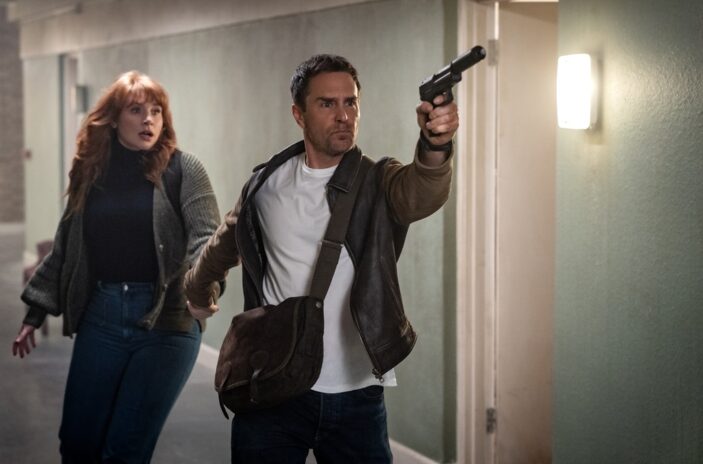
The promise of a trilogy based off a series of books that have yet to be released. A planned spy-centred universe of films that is set to crossover with the similarly themed Kingsman and a yet-to-be-named franchise. Taylor Swift theorists believing she’s the real mastermind behind it all. And don’t forget the heavily marketed feline being touted as the true identity of the in-film secret agent known as Argylle. It’s been a helluva time in the lead-up to the release of Matthew Vaughn‘s elaborate, ambitious actioner…but is it worth all the noise it’s generated?
Heavily marketed as a Henry Cavill-fronted spy outing, but far more a two-hander between Sam Rockwell and Bryce Dallas Howard, Argylle is an intentionally over-the-top effort that utilises its story-within-a-story structure to varying degrees of success. The opening minutes, all drastically exaggerated and questionably written (though intentionally so), lay down the foundation that the actions of one Argylle (Cavill) are the result of the penmanship of reclusive author Elly Conway (Howard). She’s made a name for herself writing a series of spy novels that centre around the suave Argylle, and the latest chapter plays out for us as Argylle and his right-hand, Wyatt (John Cena, surprisingly underutilised), inch closer to taking down a global spy syndicate by way of questioning the lethal LaGrange (Dua Lipa, doing all she can with little dialogue and a figure hugging dress), one of his apparent many nemeses.
But, as it would appear, these stories of espionage and secret missions are hitting a little too closely for an actual real-life spy organization that are under the impression that Elly, somehow, has knowledge or foresight regarding their, or their enemy’s, moves. Suffering a case of writer’s block, Elly tails it to the comfort of her home (Catherine O’Hara providing humorous support as her mother) to help iron out the story kinks, but, along the way, meets the strange, yet resourceful, Aidan (Rockwell, infusing the film with the necessary energy), an actual spy, who would very much like Elly to assist in his latest mission.
And so begins an expected trek across the globe as Aidan tries to unspool whatever smarts Elly has stored away in her creative mind.
Up to this point, the film has mainly flitted between Elly’s reality and her in-brain safe space, where she continually envisions the much smoother agent Argylle fending off the various villains in between snaps back to her actual existence, where Aidan is far less attractively taking names and crushing skulls; the latter a move he hopes to teach Elly, should she find herself in any nefarious situations. And we know she will, as a persistent Bryan Cranston (as the director of the evil organisation tracking her, known as The Division) continually threatens her life, driving her into the arms – or, more correctly, the expansive vineyard – of Samuel L. Jackson‘s Alfred Solomon, a former CIA deputy director, who is also after whatever knowledge Elly unintentionally hones.
Whilst it makes sense for the film to incorporate Elly’s reality and her imagination – which ultimately merge when Solomon introduces her to the “real agent Argylle” in his bid to show her how much of her writing is grounded in truth – Argylle feels like a stronger, more cohesive picture when it puts that on the backburner and sets up Elly and Aidan’s mission as she embraces her surprising capabilities. As exciting as it is to see such a large ensemble play off each other, Cavill, Cena, Lipa and Ariana DeBose (as a field technician) have very little to chew on, ultimately ending up as victims of Vaugh’s overflow of grand ideas. It gets a little too overpowered by its own sauce.
And though Rockwell and Howard are similarly victims of the film’s outlandish nature, they lean into such with more aplomb then the majority of their castmates, resulting in a duo of ridiculous sequences where they quite literally dance around the varying bodies they are decimating with every step. If Argylle was a higher rated film in terms of classification (it’s an accessible M here), it might earn Kingsman-like praise for its ballsy, brutal method of displaying violence in an unlikely manner. Because it is as bloodless as it is, Argylle‘s lunacy appears even more elevated, resulting in the film seemingly succumbing to the very ridiculousness it was winking its eye at during its opening moments. There’s no duality in the tone between Elly’s imagination and her eventual reality, which the film feels as if it’s going to initially differentiate between, before it throws out any and all rules.
But then, that’s often been Vaughn’s M.O., and given how ridiculous he’s adhered to across the Kingsman films, should we expect anything less? Whether it’s a case of the film being a victim of its own hyped intrigue, or us expecting too much from the genre itself, Argylle ultimately toes the line as an overstuffed actioner that scrapes by on good intentions and an immense likeability. It’s far too long for its own good (this did not need to exceed the 140 minute mark), but it at least sets up a bombastic-enough cinematic universe that can’t help but earn curious interest. In a world of outside “film criticism” where everything has to either be “the best thing ever since…” or “the absolute worst movie ever made”, Argylle floats in the middle ground that still very much exists. It’s serviceable and entertainingly average, and whilst the plethora of talent suggests better, the genre has delivered worse.
![]()
![]()
![]()
![]()
![]()
TWO AND A HALF STARS (OUT OF FIVE)
Argylle is now screening in Australian theatres.
